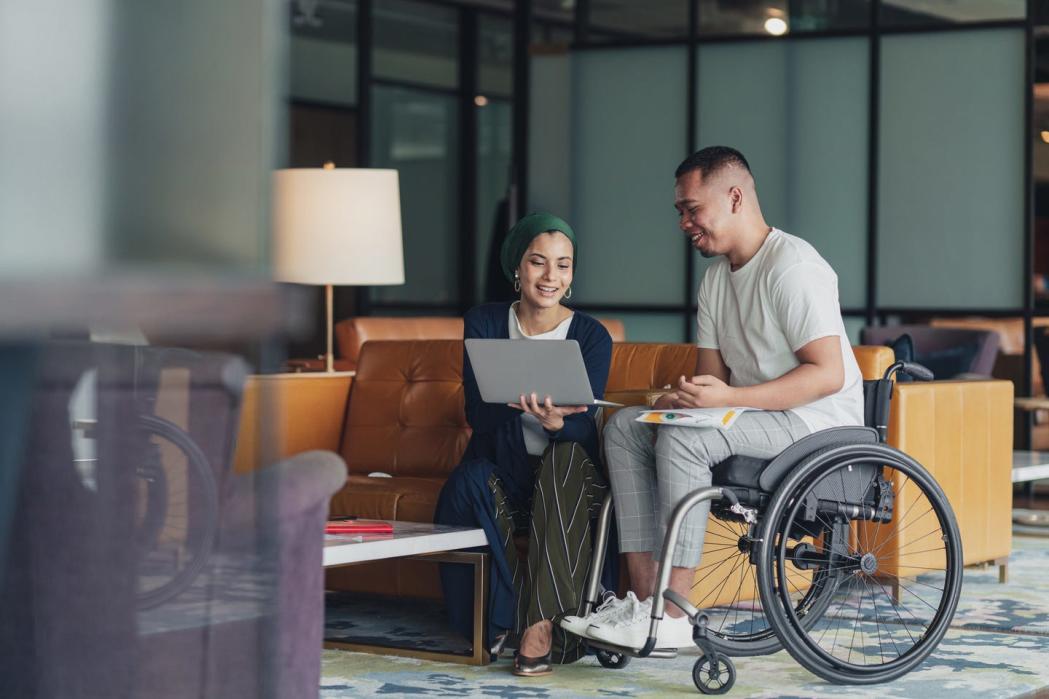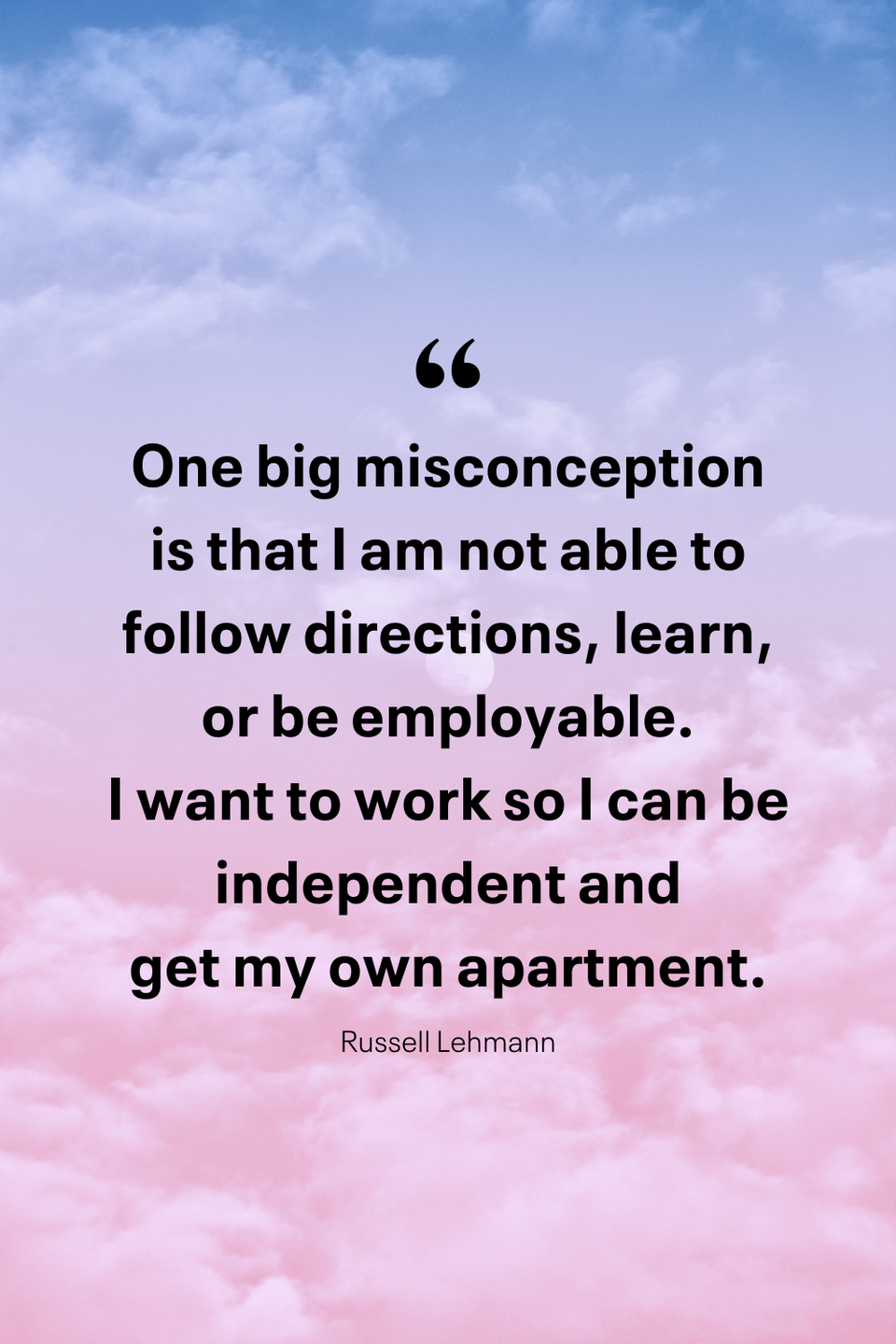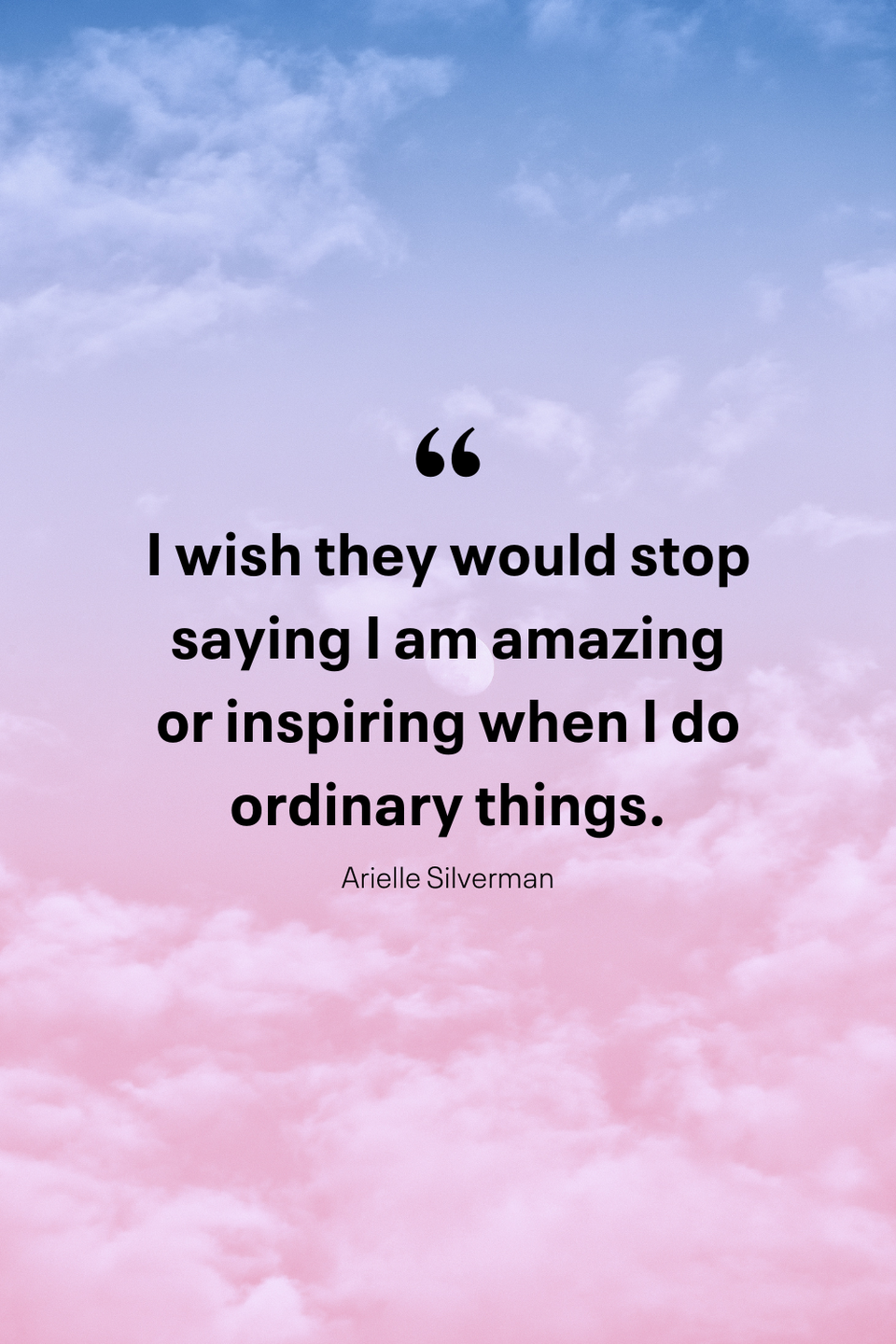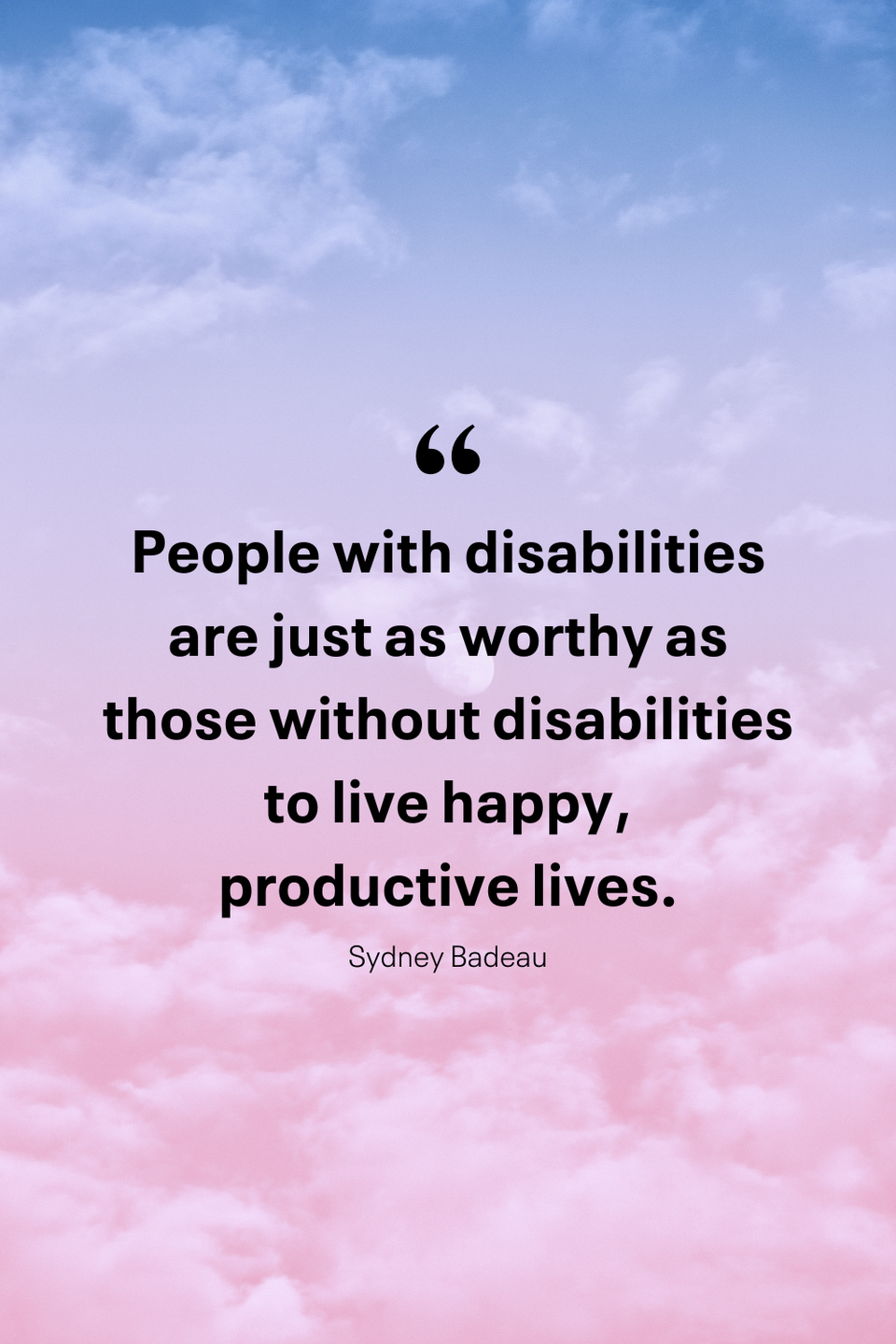What People with Disabilities Wish Those Outside the Community Would Stop Saying

One in four adults in the U.S. has a disability, including 10% percent of people who live with an "invisible" disability. And yet, the Americans with Disabilities Act, a long overdue law that protects people with disabilities in many areas of public life, was passed only three decades ago. Today, many still deal with rampant ableism, a set of beliefs or practices that devalue or discriminate against people with physical, intellectual or psychiatric disabilities.
We spoke to a variety of people from all over the country who have both visible and invisible disabilities about what they wish people outside the community knew, misconceptions that they encounter and things they wish people would stop doing or saying.
What do you wish people outside the disability community knew or understood?
“That having a disability can be a positive part of who you are. My disability has shaped my career and has allowed me to meet so many wonderful people!” — Arielle Silverman, 39, is blind. She is director of research at the American Foundation for the Blind.
“Deafness does not prevent people from being successful — discrimination is the main barrier we face.” —Sheryl Emery, 64, is deaf. She is President of National Black Deaf Advocates.
“Ableist ideas and beliefs affect people with disabilities in all aspects of life, including employment, healthcare, education, housing, transportation, etc. These ideas and beliefs create systems that discriminate and oppress people with disabilities.” —Theo W. Braddy is paralyzed from the neck down. He is executive director of The National Council on Independent Living.
“Autism can be an incredibly debilitating disability— there’s an extremely high prevalence of loneliness in the autism community. Individuals with autism die 16 years younger than the average human. 85% of college educated autistics are unemployed. I like to say that with autism I can excel at the extraordinary, but I can really struggle with the simple.”—Russell Lehmann, 33, has autism, OCD, depression and anxiety. He is a speaker, poet and activist.
“People with disabilities are just as worthy as those without disabilities to live happy, productive lives.” —Sydney Badeau, 30, has dyspraxia, a nonverbal learning disorder and a sensory processing disorder. She is an advocacy and outreach specialist at The Arc Wisconsin.
“Recognizing the importance of accessibility and inclusivity is vital. For example, having ramps and wider doorways not only benefits wheelchair users but also individuals with mild cerebral palsy, who may experience difficulty with coordination or movement on one side of their body. This promotes equality and empathy for everyone. —Ashley Glears, 30, has cerebral palsy with right hemiplegia. She is a chapter associate at The Arc of the United States.
“It’s important to understand that disability is a natural part of the human experience and that people with disabilities deserve equal rights, opportunities, and respect. I wish people outside the disability community understood the significance of inclusive practices and the value of diverse perspectives in all aspects of life.” —Dr. Yvette Pegues, Ed.D., 45, has a traumatic brain injury and spinal cord injuries. She is D&I Executive & Chief Diversity Officer at Your Invisible Disability Group.
“People with disabilities are individually different from each other. We have different goals and views. We have different approaches to life. We are just human beings who want equal access to reach our different goals.” —Sean Pevsner, 53, has cerebral palsy. He is a law firm partner with Whitburn & Pevsner, PLLC.

What do you wish people outside the disability community would stop doing and/or saying?
“I wish they would stop saying I am amazing or inspiring when I do ordinary things.”—Arielle Silverman
“Stop asking Deaf people if we can read your lips. Communication is the responsibility of all parties in a conversation. Asking the Deaf person to read your lips places all the responsibility for communicating on the Deaf person.” —Sheryl Emery
“Stop saying people with disabilities are a vulnerable population. People with disabilities are not weak and fragile - this characterization does more harm than good.” —Theo W. Braddy
“I wish people would refrain from making assumptions or judgments about individuals with disabilities based solely on their appearance or perceived limitations. It's important to approach each person with respect, understanding, and open-mindedness.” —Ashley Glears
“I wish people would stop constantly infantilizing adults with disabilities, especially those who are nonspeaking or minimally speaking.” —Elizabeth "Lizzy" Graham, 34, has Asperger’s/Autism, ADHD, Anxiety with OCD tendencies, eczema and obstructive sleep apnea. She is service coordinator for Medicaid HCBS Waiver Services at The Arc of Prince George's County.
"I wish people would stop using derogatory terms about people with disabilities and assuming that having a disability means you can't do something. For example, I enjoy 20+ adapted sports and my activity is a form of activism." —Dr. Yvette Pegues
“People should stop automatically assuming that we are brave for dealing with our disabilities. People should stop considering us vulnerable people who cannot work and contribute to our community.” —Sean Pevsner
“I wish they would stop making fun of and looking down on people with disabilities. I also wish they would stop treating people with disabilities like children. Often time, people with intellectual and developmental disabilities are treated like children. They’re not - they’re adults.” —Melody Cooper, 54, has cerebral palsy and intellectual disability. She is self-advocate specialist at The Arc of Indiana.
“One thing that I wish people would stop assuming is that people who experience disability are living off the government. This is not the case at all. We need the assistance to live a normal life like everyone else in the world and we are trying to make something for ourselves with the support we have provided to us.” —Ric Nelson, 40, has cerebral palsy. He is an executive director of Peer Power.

What's a misconception people have about you and your abilities?
“That I am lacking something or 'living in darkness.' Or that I am perpetually afraid of the world around me just because I can’t see it. My life experience is rich with many other sensations, thoughts and emotions that have nothing to do with vision or lack thereof.” —Arielle Silverman
“There are Deaf people in almost every profession. Don’t assume because a person cannot hear that they are incapable. Not everyone lip reads and we do not have better sight to make up for not being able to hear. We enjoy music, we drive. The biggest barriers we face are attitudes.” —Sheryl Emery
“The biggest misconception is they're underestimating me and the 61 million others like me - this comes from a long history of devaluing people like me.” —Theo W. Braddy
“Society has taught me from a young age that I can’t show my autism in public. So, a lot of my struggles are in my house, alone. A lot of the struggle is behind the scenes.” —Russell Lehmann
“One big misconception is that I am not able to follow directions, learn, or be employable. I want to work, so I can be independent and get my own apartment.” —Marcus Stewart, 23, has Down Syndrome.
“That not everyone with a disability presents in the same way. Some may struggle with something while others may not, and each person may need different or unique accommodations.” —Sydney Badeau

“One common misconception people have about me and my abilities is assuming that I'm only capable of simple tasks or responses, when in reality, I'm capable of understanding complex concepts and engaging in meaningful conversations across a wide range of topics.” —Ashley Glears
“I operate at the intersections of a woman of color with visible and non-visible disabilities, so I encounter many layers of misconceptions in my life. Nevertheless, I’m a proud wife, mom, engineer, educator, and advocate. My daily fight for the cessation of stereotypes and stigmatizing language surrounding disability is not for me, but others without the voice to fight for themselves. I wish people understood the innovative contributions that disabled people bring to communities and society.”
—Dr. Yvette Pegues“People have the misconception that I cannot represent people in cases. They assume incorrectly that since I have a speech impairment, I cannot argue for my clients’ best interest. It is very tiring to have to constantly prove myself.” —Sean Pevsner
“People have thought that I would never be anything or do anything, that I don’t know what’s going on in the world. Having an intellectual disability does not mean you’re dumb. They work harder than most just to do things others take for granted. They may need help with certain things, but don’t we all?” —Melody Cooper
You Might Also Like

